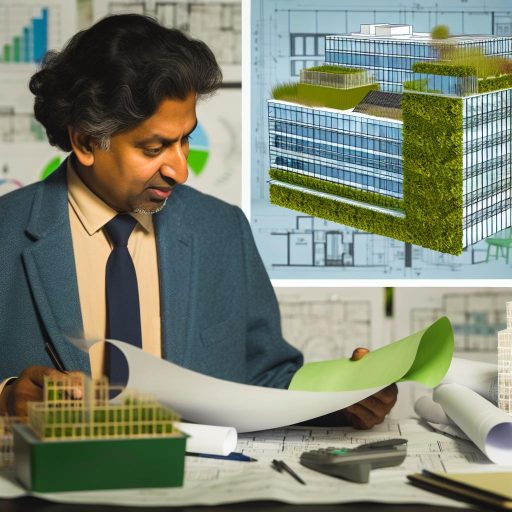Overview of Commercial Real Estate Law: Key Principles for Property Developers
Understanding Commercial Real Estate Law
Commercial real estate law governs properties intended for business purposes.
This area of law regulates transactions, leasing, and property management.
Therefore, developers must navigate various legal frameworks.
These include federal, state, and local regulations.
Key Legal Principles for Developers
Property developers should understand several key legal principles.
- Contracts: Developers must draft clear and enforceable contracts.
- Zoning Laws: Developers need to comply with local zoning regulations.
- Financing: Understanding financing options enhances development opportunities.
- Environmental Regulations: Developers must adhere to environmental laws.
- Land Use: Proper land use planning helps avoid legal disputes.
Navigating Contracts
Contracts form the backbone of real estate transactions.
Developers need to ensure all contracts are precise and comprehensive.
Additionally, they should include important terms such as timelines and responsibilities.
Legal counsel can help in drafting and reviewing contracts.
Complying with Zoning Laws
Zoning laws determine how property can be used.
These laws vary by municipality and can impact development significantly.
Developers should research zoning restrictions before purchasing land.
Variances may be necessary if intended use deviates from zoning laws.
Understanding Financing Options
Financing is crucial for property development projects.
Developers may explore loans, grants, or private funding sources.
Transform Your Real Estate Decisions
Unlock personalized real estate insights crafted just for you. Get actionable advice designed to amplify your success.
Get StartedEach financing option has different implications and requirements.
Consulting with a financial advisor can provide clarity on the best options.
Adhering to Environmental Regulations
Environmental regulations protect natural resources during development.
Developers must conduct environmental assessments before starting projects.
Compliance can help avoid costly fines and litigation.
Additionally, it shows commitment to sustainable practices.
Effective Land Use Planning
Land use planning is essential for successful property development.
It involves assessing market demand and site suitability.
Strategic planning can prevent conflicts with local communities.
Moreover, it helps in maximizing property value over time.
Understanding Zoning Laws and Their Impact on Property Development
What are Zoning Laws?
Zoning laws dictate how land can be used in specific areas.
They regulate the type of structures permitted on a property.
Moreover, these laws influence the density of development.
Local government sets zoning regulations to manage land use.
Showcase Your Real Estate Business
Publish your company profile on our blog for just $200. Gain instant exposure and connect with a dedicated audience of real estate professionals and enthusiasts.
Publish Your ProfileTypes of Zoning
There are various types of zoning classifications.
Residential zoning focuses on housing development.
Commercial zoning allows for businesses and retail establishments.
Industrial zoning is designated for manufacturing and warehouses.
Mixed-use zoning combines residential and commercial uses.
Impact on Property Development
Zoning laws significantly impact property development decisions.
Developers must review local zoning ordinances before proceeding.
Compliance ensures legal development and avoids penalties.
Understanding zoning can help identify development opportunities.
Challenges of Zoning Regulations
Zoning laws can sometimes impose restrictions.
These restrictions may limit project scope and feasibility.
Additionally, obtaining variances can be a lengthy process.
Developers often face delays due to zoning board approvals.
Strategies for Navigating Zoning Laws
Engaging with local planners can provide valuable insight.
Networking with other developers may yield helpful advice.
Moreover, understanding community goals can aid negotiations.
Lastly, consider hiring a zoning attorney for complex issues.
Navigating Environmental Regulations in Commercial Real Estate Development
Understanding Environmental Regulations
Environmental regulations impact commercial real estate development significantly.
These rules often dictate land use, water management, and habitat protection.
Developers must comply with federal, state, and local regulations.
Noncompliance can lead to legal issues and financial penalties.
Key Federal Regulations
Several federal laws influence commercial real estate projects.
The National Environmental Policy Act (NEPA) mandates environmental assessments.
This act requires developers to evaluate potential environmental effects.
The Clean Water Act protects water quality in projects involving waterways.
Additionally, the Endangered Species Act safeguards endangered wildlife habitats.
State and Local Regulations
States often have their own environmental regulations.
Each state tailors its rules based on local needs and ecosystems.
Community zoning laws can also affect development projects significantly.
Local governments may impose restrictions on land use and construction.
Showcase Your Real Estate Business
Publish your company profile on our blog for just $200. Gain instant exposure and connect with a dedicated audience of real estate professionals and enthusiasts.
Publish Your ProfileIdentifying Environmental Impact Assessment Needs
An environmental impact assessment (EIA) evaluates potential project impacts.
Conducting an EIA is a legal requirement in many jurisdictions.
This assessment helps identify significant environmental concerns.
Stakeholders can address these concerns early in the planning process.
Permitting Process and Compliance
Obtaining necessary permits is vital before initiating any project.
Common permits include those for land disturbance, water usage, and discharge.
Ensure all permits are vetted and secured to avoid delays.
Understanding the permitting timelines is essential for project scheduling.
Mitigation Strategies
Developers should consider mitigation strategies for environmental impacts.
These strategies may involve habitat restoration or pollution controls.
By planning for mitigation, developers can enhance their projects’ viability.
Moreover, effective mitigation can improve community relations.
Engaging with Community and Stakeholders
Community feedback is vital throughout the development process.
Engage with local residents and stakeholders early on.
This approach builds trust and addresses potential concerns.
Transparent communication fosters a positive project image.
Staying Informed on Regulatory Changes
Regulations can change, impacting ongoing and future projects.
Developers must stay informed about legislative updates.
Participating in industry associations can provide valuable insights.
Regular training and workshops also help keep teams updated.
Discover More: Multi-Family Housing Legal Considerations for Landlords and Investors
The Role of Contracts in Property Development
Importance of Contracts
Contracts serve as the foundation of property development.
They outline the responsibilities of each party involved.
Moreover, contracts minimize legal risks during the development process.
By having clear agreements, parties can avoid misunderstandings.
Types of Contracts
Several types of contracts are essential for property developers.
Purchase agreements finalize the sale of property.
Lease agreements outline the terms for renting property.
Construction contracts detail the scope of work for builders.
Service agreements define the roles of consultants and subcontractors.
Showcase Your Real Estate Business
Publish your company profile on our blog for just $200. Gain instant exposure and connect with a dedicated audience of real estate professionals and enthusiasts.
Publish Your ProfileBest Practices for Drafting Contracts
Developers should follow best practices when drafting contracts.
First, use clear and concise language to avoid confusion.
Next, ensure all critical terms are included in the contract.
Additionally, consult legal professionals to review contracts.
Regularly update contracts to reflect changing circumstances.
Finally, maintain organized records of all contracts for easy access.
Negotiating Contracts
Effective negotiation is vital for successful contracts.
Start discussions with a clear understanding of your goals.
Listen actively to the other party’s concerns or expectations.
Be flexible to find common ground during negotiations.
Document any agreed-upon changes for future reference.
Common Contractual Issues
Property developers frequently encounter contractual issues.
Disputes may arise from unclear terms or conditions.
Additionally, changes in project scope can lead to conflicts.
Developers should also be cautious of delays in performance.
Resolving these issues quickly can help maintain positive relationships.
You Might Also Like: Navigating Lease And Zoning Regulations In Commercial Real Estate Law
Financing Commercial Real Estate Projects: Legal Considerations and Options
Understanding Financing Options
Property developers must explore various financing options for their projects.
Conventional loans from banks are common in commercial real estate.
Developers should also consider private equity or venture capital financing.
Additionally, crowdfunding has emerged as a popular option for many projects.
Understanding the pros and cons of each option is crucial.
Legal Considerations in Financing
Legal documents play an important role in financing arrangements.
Contracts should clearly outline the terms of the loan or investment.
Developers must pay attention to interest rates and repayment terms.
Moreover, ensure compliance with local and federal regulations.
Obtaining the right legal advice can prevent future disputes.
Negotiating Financing Terms
Negotiating favorable terms is key to successful financing.
Understanding market conditions can strengthen your negotiation position.
Be prepared to present a solid business plan to potential investors.
Showcase Your Real Estate Business
Publish your company profile on our blog for just $200. Gain instant exposure and connect with a dedicated audience of real estate professionals and enthusiasts.
Publish Your ProfileHighlight expected returns and timeline to instill confidence.
Flexibility in negotiations can lead to better financing solutions.
Leveraging Government Incentives
Many jurisdictions offer incentives for commercial real estate projects.
These incentives may include tax breaks or grants for development.
Developers should research available programs in their area.
Applying for government funding can enhance project feasibility.
Understanding eligibility requirements is critical for success.
Understanding Risk Management
Risk management is essential in financing commercial projects.
Developers should evaluate market risks and economic shifts.
Insurance and surety bonds can mitigate certain financial risks.
Additionally, diversifying funding sources can spread risk.
Establishing an effective risk management strategy safeguards investments.
Implications of Legal Insights in Financing
Navigating commercial real estate financing requires careful consideration.
Investors and developers must understand their legal obligations.
With the right approach, financing can lead to successful project completion.
Seek professional guidance to make informed financial decisions.
Gain More Insights: Pros and Cons of Fixed vs. Variable Rates in Commercial Loans

Negotiating Lease Agreements: Key Provisions and Common Pitfalls
Understanding Key Provisions
Lease agreements contain several crucial provisions.
Each provision serves a specific purpose in the leasing process.
Before signing, thoroughly review these essential elements.
- Rent Amount
- Lease Term
- Maintenance Responsibilities
- Renewal Options
- Termination Clauses
Rent Amount
Clearly outline the rent amount in the lease agreement.
Specify whether this amount is fixed or subject to increase.
Understanding payment methods and due dates is vital.
Lease Term
The lease term details how long the agreement lasts.
Consider the flexibility of short-term versus long-term leases.
Make provisions for renewal to avoid confusion later.
Maintenance Responsibilities
Clearly designate maintenance responsibilities between parties.
This can prevent disputes over property upkeep.
Specifically mention what repairs each party handles.
Renewal Options
Include options for extending the lease duration.
Showcase Your Real Estate Business
Publish your company profile on our blog for just $200. Gain instant exposure and connect with a dedicated audience of real estate professionals and enthusiasts.
Publish Your ProfileExplain the process for exercising renewal rights.
This allows developers to plan for long-term occupancy.
Termination Clauses
Termination clauses detail how either party can end the agreement.
Understand the notice period required for termination.
Specifying conditions for termination protects both parties.
Avoiding Common Pitfalls
Negotiating leases can be fraught with common pitfalls.
Understanding these can help avoid costly mistakes.
- Not Reading the Entire Agreement
- Underestimating Costs
- Ignoring the Fine Print
- Failing to Negotiate
Not Reading the Entire Agreement
Carefully read and understand the entire lease document.
Many potential issues lie in overlooked clauses.
Underestimating Costs
Consider all potential costs beyond rent.
This includes maintenance, utilities, and taxes.
Unexpected costs can strain budgets and resources.
Ignoring the Fine Print
Fine print often contains critical information.
Neglecting this may lead to misunderstandings later.
Always clarify ambiguous terms with the landlord.
Failing to Negotiate
Always enter negotiations prepared to discuss terms.
Many landlords expect some level of negotiation.
Fostering a collaborative approach can lead to better terms.
Find Out More: Commercial Real Estate Law for Zoning and Land Use
Dispute Resolution in Commercial Real Estate
Overview of Dispute Resolution Methods
Disputes in commercial real estate often arise during various stages of a project.
Resolving these conflicts efficiently is crucial for property developers.
Three primary methods exist for dispute resolution: mediation, arbitration, and litigation.
Each method has distinct processes and implications for developers.
Mediation
Mediation is a collaborative process between disputing parties.
A neutral third party facilitates communication and negotiation.
This method allows for creative solutions tailored to both parties’ needs.
Importantly, mediation is often faster and less expensive than other methods.
Developers should consider mediation for minor disagreements.
However, mediation results are non-binding unless both parties agree.
Benefits of Mediation
- Mediation fosters cooperative relationships.
- It preserves confidentiality throughout the process.
- It often leads to mutual satisfaction with outcomes.
Arbitration
Arbitration involves a more formal process than mediation.
Showcase Your Real Estate Business
Publish your company profile on our blog for just $200. Gain instant exposure and connect with a dedicated audience of real estate professionals and enthusiasts.
Publish Your ProfileA neutral arbitrator hears evidence and makes a binding decision.
This method resembles a courtroom setting but is typically more efficient.
For many property developers, arbitration is an appealing option.
It offers a final resolution without the lengthy delays of litigation.
Advantages of Arbitration
- Arbitration decisions are usually enforceable in court.
- The process is generally quicker than litigation.
- It’s often less costly compared to traditional court cases.
Lawsuits and Litigation
Lawsuits involve formal court proceedings that can take years to resolve.
This method is the most adversarial of the three discussed.
Developers may resort to litigation when disputes cannot be settled amicably.
However, litigation can be costly and public, leading to reputational risks.
Considerations for Litigation
- Litigation may result in an unexpected outcome.
- It can damage relationships between parties long-term.
- The process can divert resources and focus away from projects.
Choosing the Right Method
Selecting a dispute resolution method depends on various factors.
Developers must consider the nature and complexity of the dispute.
Additionally, the desired speed of resolution is crucial.
Understanding the potential costs involved is also important.
By carefully evaluating these aspects, developers can choose wisely.
Emerging Trends in Commercial Real Estate Law
Impacts of Technology
Technology is reshaping commercial real estate law significantly.
The rise of smart buildings is one major development.
These buildings incorporate advanced technologies for energy efficiency.
Legal frameworks must adapt to these innovations.
Additionally, blockchain technology is transforming property transactions.
It enhances transparency and security in real estate deals.
As a result, developers must understand blockchain implications.
Moreover, predictive analytics aid in investment decisions.
This technology helps assess market trends effectively.
Legal guidelines need to evolve to accommodate such tools.
Adapting to Digital Transactions
Digital transactions are becoming the norm in commercial real estate.
With e-signatures, deals can finalize more quickly.
This convenience raises questions about compliance and security.
Developers must ensure digital processes meet regulatory standards.
Legal professionals should provide guidance on best practices.
Furthermore, cybersecurity is a critical concern.
Protecting sensitive data is paramount in online transactions.
Showcase Your Real Estate Business
Publish your company profile on our blog for just $200. Gain instant exposure and connect with a dedicated audience of real estate professionals and enthusiasts.
Publish Your ProfileIntegration of Virtual Reality
Virtual reality (VR) technologies are gaining traction in property marketing.
They offer immersive experiences for potential buyers and tenants.
This technology changes how properties are showcased.
Consequently, legal considerations around VR usage are emerging.
Clear guidelines on liability and copyright are essential.
Smart Contracts in Real Estate
Smart contracts can automate various aspects of real estate transactions.
They execute agreements when specific conditions are met.
While this innovation improves efficiency, it raises legal questions.
Developers need to understand the enforceability of smart contracts.
Legal systems must adapt to recognize these automated agreements.
Impacts of Sustainability
Sustainability is becoming a priority in commercial real estate development.
Green building practices are gaining popularity.
Developers are increasingly focusing on energy-efficient designs.
Compliance with environmental regulations has never been more critical.
Legal frameworks now include stringent sustainability standards.
Moreover, incentives for green developments are available.
Climate Change and Risk Management
Climate change adaptation is a growing concern in real estate law.
Property developers face increased risks due to extreme weather events.
Legal strategies must address these heightened risks.
Insurance requirements may evolve to include climate-related coverage.
Therefore, thorough risk assessments will be essential.
Community Engagement and Social Responsibility
Developers are placing greater emphasis on community engagement.
Social responsibility is now an integral part of real estate projects.
Legal considerations around community involvement are emerging.
Developers should know how to navigate these community dynamics.
Additionally, fair housing laws must be a priority in all projects.
Ultimately, responsible development fosters positive community relations.




